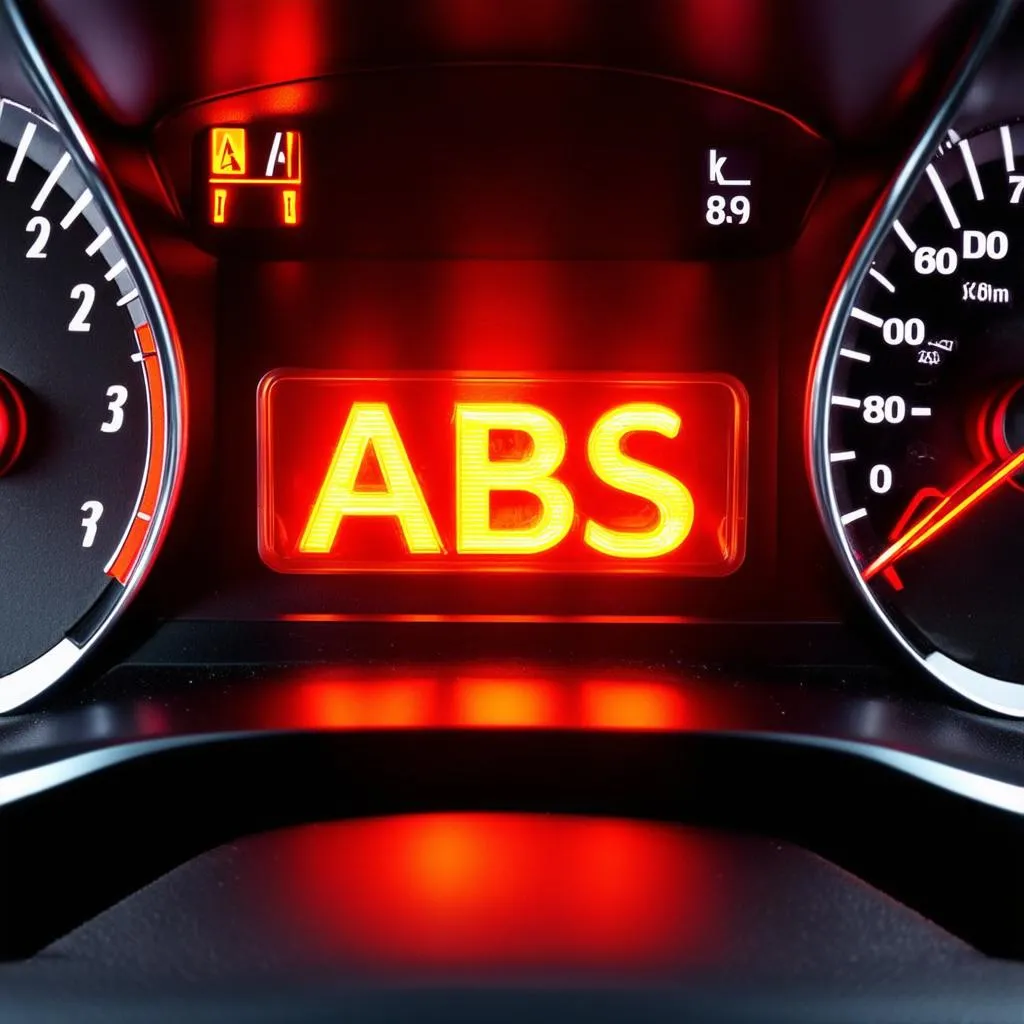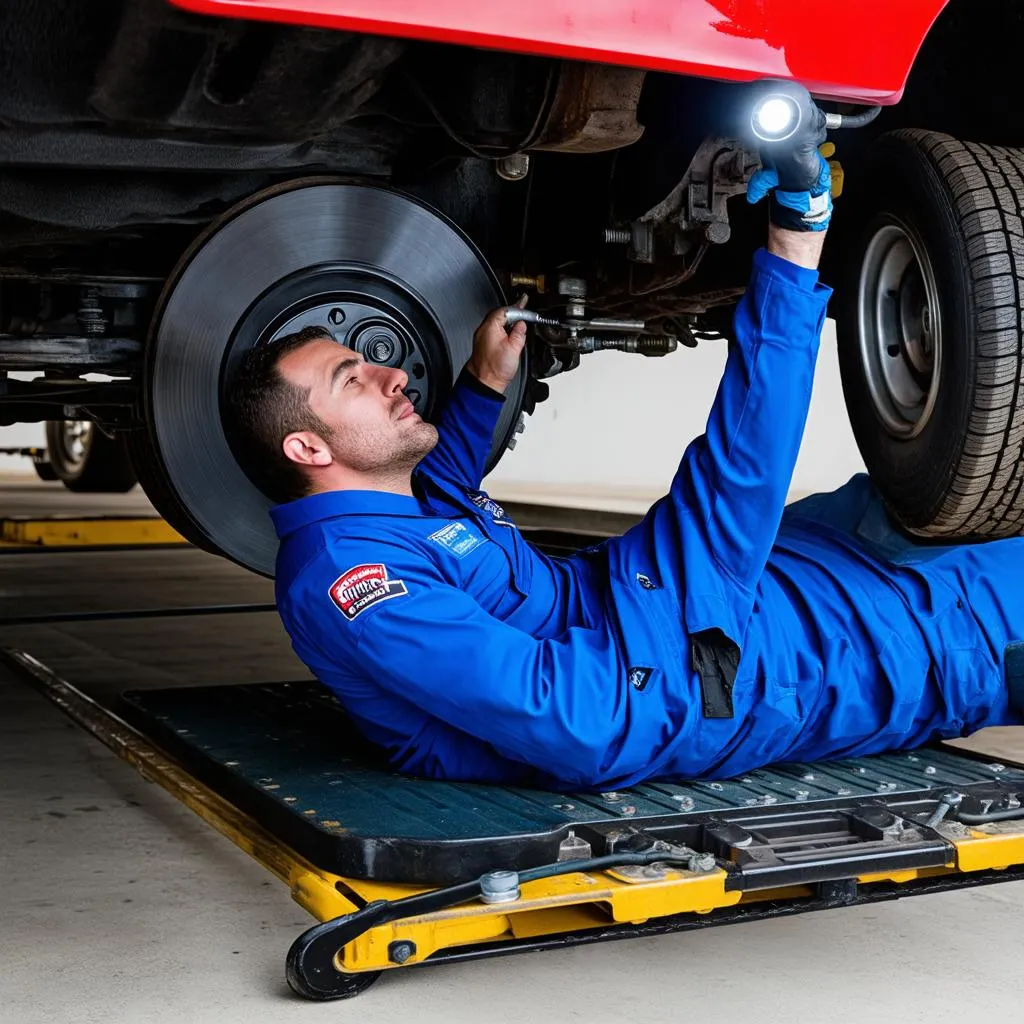Picture this: you’re driving down a rain-slicked highway in your trusty 2018 Ford Focus when suddenly, a deer jumps out in front of you. You slam on the brakes, but instead of that familiar pulsing sensation, you hear a grinding noise and your car skids. Your heart is racing as you narrowly avoid a collision, left wondering, “What just happened to my brakes?”
This, my friends, is a prime example of why a functioning Anti-lock Braking System (ABS) is crucial for your safety. That yellow or orange light flashing ominously on your dashboard isn’t just a suggestion – it’s a warning that needs immediate attention.
What Does the ABS Malfunction Light Mean?
From a mechanic’s perspective, the ABS light is like a distress signal from your car’s braking system. It tells us that something within the intricate network of sensors, pumps, and control modules isn’t playing nice.
Technically speaking, the ABS prevents your wheels from locking up during hard braking, allowing you to maintain steering control and avoid a skid. This is particularly important in adverse conditions like rain, snow, or icy roads in states like Alaska or Colorado.
Economically, ignoring an ABS malfunction light can be a costly mistake. What might start as a minor sensor issue could snowball into a full-blown brake system failure if left unchecked, leading to expensive repairs.
Decoding the ABS Malfunction Mystery
So, why is your ABS light on? Let’s investigate some common culprits:
1. Faulty Wheel Speed Sensors
- The Usual Suspects: These sensors, often located near the wheel hub assembly, are responsible for telling the ABS control module how fast each wheel is spinning. A bad sensor can send inaccurate data, triggering the warning light.
- The Telltale Signs: You might notice your speedometer acting erratically or cruise control malfunctioning if a wheel speed sensor is on the fritz.
2. ABS Control Module Issues
- The Brain of the Operation: This module is the mastermind behind your ABS, receiving data from the sensors and regulating brake pressure accordingly.
- The Glitch in the Matrix: Like any computer, the ABS module can suffer from electrical faults, software glitches, or even complete failure, especially in older vehicles.
3. Low Brake Fluid
- The Lifeblood of Your Brakes: Brake fluid is essential for transmitting the force from your foot on the brake pedal to the actual brakes.
- The Domino Effect: Low brake fluid levels can indicate a leak in the system, potentially affecting ABS performance. For more information on how low brake fluid can impact your ABS, check out our article: “Can Low Brake Fluid Cause ABS Light?”.
4. Damaged ABS Rings or Wiring
- The Unsung Heroes: ABS rings are toothed rings located on the wheel bearings, while the wiring connects various components of the system.
- The Weakest Link: Physical damage, corrosion, or loose connections can disrupt the flow of information within the ABS system.
Taking Action: What to Do When Your ABS Light Turns On
-
Don’t Panic, But Don’t Ignore It: While a flashing ABS light doesn’t necessarily mean your brakes have completely failed, it’s crucial to address the issue promptly.
-
Check Your Brake Fluid: This is a simple DIY check you can do at home. Refer to your vehicle’s owner’s manual for the location of the brake fluid reservoir and instructions on how to check the fluid level.
-
Get Thee to a Mechanic! If your brake fluid level is low or if the ABS light remains illuminated, it’s time to seek professional help. A qualified mechanic, like those at our partner shops across the US, can use a specialized scan tool, such as the Autel MaxiSys Elite, to diagnose the specific problem and recommend the necessary repairs. They might check for error codes stored in the ABS module, inspect the wheel speed sensors, or examine the wiring for any damage.
 Car dashboard with illuminated ABS warning light
Car dashboard with illuminated ABS warning light
Common Questions About ABS Malfunctions
Here are some frequently asked questions we receive from car owners like you:
- Can I still drive with the ABS light on? While you might still have regular braking functionality, your ABS might not engage properly in emergency situations. This can be especially dangerous on slick roads like those found on Lombard Street in San Francisco.
- How much does it cost to fix an ABS problem? The cost of repair can vary greatly depending on the underlying issue, the make and model of your vehicle, and labor rates in your area.
- Can I check the ABS light without a scan tool? While a scan tool is the most accurate way to diagnose ABS issues, there are some workarounds for specific vehicles. For instance, you can find instructions on how to check the ABS light without a scan tool for certain Subaru models on our website. However, it’s always recommended to consult with a professional for a proper diagnosis. Check out our article on “How to Check ABS Light Without a Scan Tool” for more details.
 Mechanic inspecting a car's brake system with a flashlight
Mechanic inspecting a car's brake system with a flashlight
Beyond the ABS Light: Other Brake System Warning Signs
- ABS Light Came On Then Went Off: While this might seem like a temporary glitch, it’s still worth getting it checked out as it could be an early warning sign of a developing issue. Read more in our article: “ABS Light Came On Then Went Off.”
- Soft or Spongy Brake Pedal: This could indicate air in the brake lines, a leak, or a problem with the master cylinder.
- Grinding Noise When Braking: This usually means your brake pads are worn down and need to be replaced.
Don’t Let Your Brakes Leave You Hanging
Your car’s braking system is its most important safety feature. Don’t ignore the warning signs. If your ABS light is on, address it promptly. Regular maintenance and timely repairs can help ensure your brakes are always ready to perform when you need them most.
Need help diagnosing your ABS malfunction? Contact us on WhatsApp at +84767531508. Our team of auto repair experts is available 24/7 to assist you with all your diagnostic tool needs.
We hope this article has shed some light on the mystery of the ABS malfunction light. Remember, an informed driver is a safe driver! For more information on ABS systems and related topics, explore our other informative articles on DiagXCar.com.